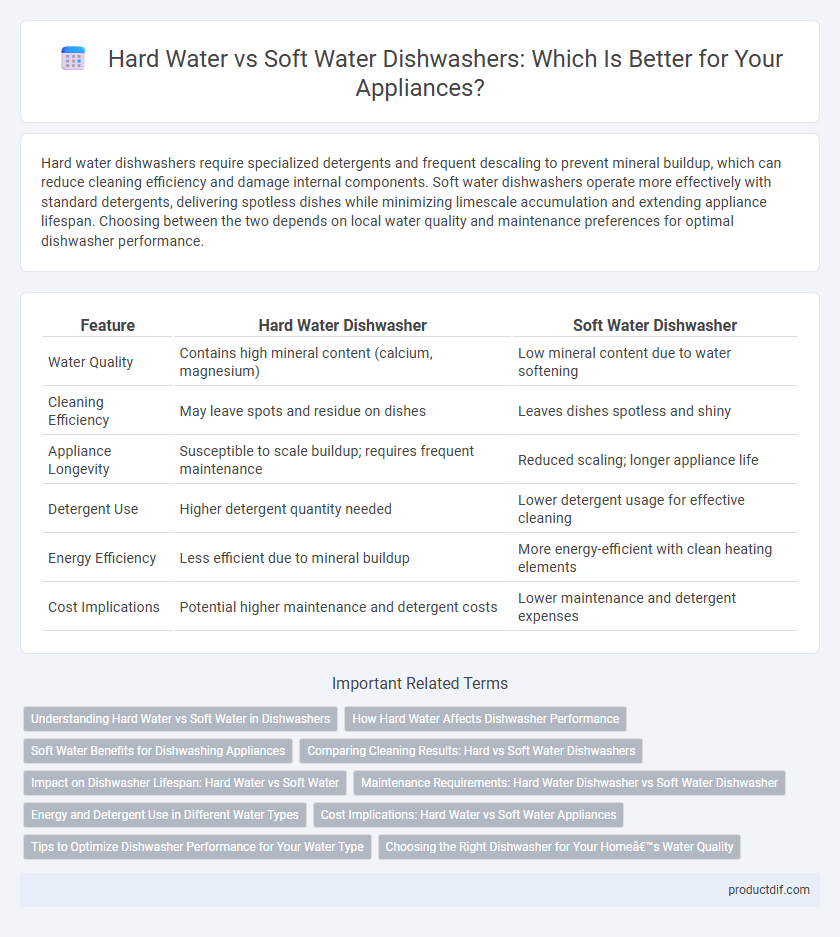Hard water dishwashers require specialized detergents and frequent descaling to prevent mineral buildup, which can reduce cleaning efficiency and damage internal components. Soft water dishwashers operate more effectively with standard detergents, delivering spotless dishes while minimizing limescale accumulation and extending appliance lifespan. Choosing between the two depends on local water quality and maintenance preferences for optimal dishwasher performance.
Table of Comparison
| Feature | Hard Water Dishwasher | Soft Water Dishwasher |
|---|---|---|
| Water Quality | Contains high mineral content (calcium, magnesium) | Low mineral content due to water softening |
| Cleaning Efficiency | May leave spots and residue on dishes | Leaves dishes spotless and shiny |
| Appliance Longevity | Susceptible to scale buildup; requires frequent maintenance | Reduced scaling; longer appliance life |
| Detergent Use | Higher detergent quantity needed | Lower detergent usage for effective cleaning |
| Energy Efficiency | Less efficient due to mineral buildup | More energy-efficient with clean heating elements |
| Cost Implications | Potential higher maintenance and detergent costs | Lower maintenance and detergent expenses |
Understanding Hard Water vs Soft Water in Dishwashers
Hard water dishwashers require specialized detergent and regular descaling due to mineral deposits like calcium and magnesium, which cause residue buildup and reduce appliance efficiency. Soft water dishwashers, benefiting from fewer minerals, enable better cleaning performance and longer appliance lifespan by preventing scale formation. Understanding the water hardness level in your area is crucial for optimizing dishwasher settings and maintenance to ensure optimal cleaning results and durability.
How Hard Water Affects Dishwasher Performance
Hard water negatively impacts dishwasher performance by causing mineral buildup, particularly calcium and magnesium deposits, which clog spray nozzles and reduce water flow. This mineral scaling leads to ineffective cleaning, spots on dishes, and potential damage to heating elements, ultimately shortening the appliance's lifespan. Soft water dishwashers prevent these issues by using water with lower mineral content, ensuring optimal cleaning efficiency and maintenance.
Soft Water Benefits for Dishwashing Appliances
Soft water dishwashers enhance appliance longevity by reducing mineral buildup that often clogs internal components, ensuring consistent water flow and optimal cleaning performance. They improve detergent efficiency, allowing for lower chemical usage and preventing residue spots on dishes and glassware. Utilizing soft water minimizes scaling on heating elements, which reduces energy consumption and maintenance costs associated with hard water damage.
Comparing Cleaning Results: Hard vs Soft Water Dishwashers
Hard water dishwashers often leave mineral deposits and white spots on dishes and glassware due to high calcium and magnesium content, affecting overall cleaning performance. Soft water dishwashers provide superior cleaning results by preventing scale buildup, ensuring spotless and streak-free dishes. Using water softeners or built-in soft water systems in dishwashers enhances detergent efficiency, leading to better stain and grease removal.
Impact on Dishwasher Lifespan: Hard Water vs Soft Water
Hard water dishwashers experience reduced lifespan due to mineral buildup, such as calcium and magnesium deposits, which clog spray arms and heating elements. Soft water dishwashers benefit from fewer mineral deposits, leading to improved appliance efficiency and extended longevity. Regular use of water softeners can significantly minimize maintenance needs and prevent premature dishwasher failure.
Maintenance Requirements: Hard Water Dishwasher vs Soft Water Dishwasher
Hard water dishwashers require more frequent descaling and buildup removal due to mineral deposits such as calcium and magnesium, which can clog spray arms and reduce efficiency. Soft water dishwashers experience less scaling and generally need less maintenance, extending the lifespan of internal components and maintaining optimal spray performance. Using water softeners or built-in water conditioning systems can significantly reduce maintenance needs for hard water dishwashers.
Energy and Detergent Use in Different Water Types
Hard water dishwashers require more energy due to mineral buildup that reduces heating efficiency and often necessitate longer cycles to ensure cleanliness. Detergent consumption increases in hard water conditions since minerals bind with soap, reducing its effectiveness and prompting the use of specialized, higher-dose detergents. Soft water dishwashers, by contrast, optimize energy use with faster heating and cut detergent quantities by enhancing soap solubility, resulting in more efficient, cost-effective wash cycles.
Cost Implications: Hard Water vs Soft Water Appliances
Hard water dishwashers often incur higher maintenance costs due to mineral buildup that reduces efficiency and damages components over time. Soft water dishwashers require less frequent repairs and consume less detergent, leading to overall lower operational expenses. Investing in a soft water appliance can result in long-term savings despite a potentially higher initial purchase price.
Tips to Optimize Dishwasher Performance for Your Water Type
Adjust dishwasher settings based on your water hardness level to improve cleaning efficiency and prevent mineral buildup; use a water softener or add rinse aid when dealing with hard water to reduce spotting and scaling. For soft water, select gentler detergent formulations and avoid overusing additives to prevent excessive sudsing and residue. Regularly clean filters and spray arms to maintain optimal water flow and ensure effective washing regardless of water type.
Choosing the Right Dishwasher for Your Home’s Water Quality
Selecting the right dishwasher depends heavily on your home's water hardness level, as hard water dishwashers are designed with specialized filters and mineral-resistant components to combat scale buildup. Soft water dishwashers require less maintenance and provide superior cleaning performance due to lower mineral content, preventing spots and residue on dishes. Understanding your local water quality through a hardness test can help you choose a dishwasher optimized for durability, efficiency, and sparkling results.
Hard Water Dishwasher vs Soft Water Dishwasher Infographic

 productdif.com
productdif.com